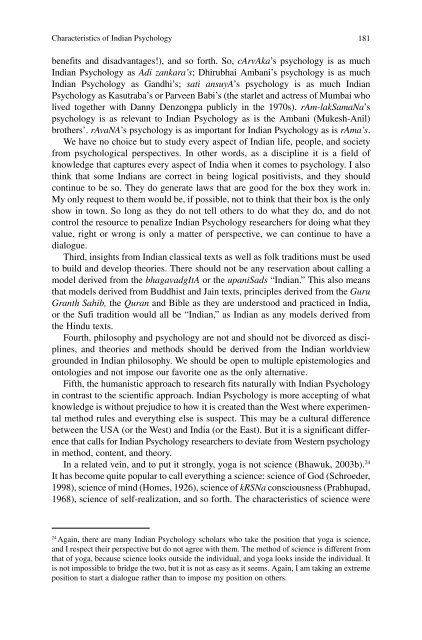Spirituality and Indian Psychology: Lessons from ... - Mandhata Global
Spirituality and Indian Psychology: Lessons from ... - Mandhata Global
Spirituality and Indian Psychology: Lessons from ... - Mandhata Global
Create successful ePaper yourself
Turn your PDF publications into a flip-book with our unique Google optimized e-Paper software.
Characteristics of <strong>Indian</strong> <strong>Psychology</strong><br />
benefits <strong>and</strong> disadvantages!), <strong>and</strong> so forth. So, cArvAka’s psychology is as much<br />
<strong>Indian</strong> <strong>Psychology</strong> as Adi zankara’s; Dhirubhai Ambani’s psychology is as much<br />
<strong>Indian</strong> <strong>Psychology</strong> as G<strong>and</strong>hi’s; sati ansuyA’s psychology is as much <strong>Indian</strong><br />
<strong>Psychology</strong> as Kasutraba’s or Parveen Babi’s (the starlet <strong>and</strong> actress of Mumbai who<br />
lived together with Danny Denzongpa publicly in the 1970s). rAm-lakSamaNa’s<br />
psychology is as relevant to <strong>Indian</strong> <strong>Psychology</strong> as is the Ambani (Mukesh-Anil)<br />
brothers’. rAvaNA’s psychology is as important for <strong>Indian</strong> <strong>Psychology</strong> as is rAma’s.<br />
We have no choice but to study every aspect of <strong>Indian</strong> life, people, <strong>and</strong> society<br />
<strong>from</strong> psychological perspectives. In other words, as a discipline it is a field of<br />
knowledge that captures every aspect of India when it comes to psychology. I also<br />
think that some <strong>Indian</strong>s are correct in being logical positivists, <strong>and</strong> they should<br />
continue to be so. They do generate laws that are good for the box they work in.<br />
My only request to them would be, if possible, not to think that their box is the only<br />
show in town. So long as they do not tell others to do what they do, <strong>and</strong> do not<br />
control the resource to penalize <strong>Indian</strong> <strong>Psychology</strong> researchers for doing what they<br />
value, right or wrong is only a matter of perspective, we can continue to have a<br />
dialogue.<br />
Third, insights <strong>from</strong> <strong>Indian</strong> classical texts as well as folk traditions must be used<br />
to build <strong>and</strong> develop theories. There should not be any reservation about calling a<br />
model derived <strong>from</strong> the bhagavadgItA or the upaniSads “<strong>Indian</strong>.” This also means<br />
that models derived <strong>from</strong> Buddhist <strong>and</strong> Jain texts, principles derived <strong>from</strong> the Guru<br />
Granth Sahib, the Quran <strong>and</strong> Bible as they are understood <strong>and</strong> practiced in India,<br />
or the Sufi tradition would all be “<strong>Indian</strong>,” as <strong>Indian</strong> as any models derived <strong>from</strong><br />
the Hindu texts.<br />
Fourth, philosophy <strong>and</strong> psychology are not <strong>and</strong> should not be divorced as disciplines,<br />
<strong>and</strong> theories <strong>and</strong> methods should be derived <strong>from</strong> the <strong>Indian</strong> worldview<br />
grounded in <strong>Indian</strong> philosophy. We should be open to multiple epistemologies <strong>and</strong><br />
ontologies <strong>and</strong> not impose our favorite one as the only alternative.<br />
Fifth, the humanistic approach to research fits naturally with <strong>Indian</strong> <strong>Psychology</strong><br />
in contrast to the scientific approach. <strong>Indian</strong> <strong>Psychology</strong> is more accepting of what<br />
knowledge is without prejudice to how it is created than the West where experimental<br />
method rules <strong>and</strong> everything else is suspect. This may be a cultural difference<br />
between the USA (or the West) <strong>and</strong> India (or the East). But it is a significant difference<br />
that calls for <strong>Indian</strong> <strong>Psychology</strong> researchers to deviate <strong>from</strong> Western psychology<br />
in method, content, <strong>and</strong> theory.<br />
In a related vein, <strong>and</strong> to put it strongly, yoga is not science (Bhawuk, 2003b). 24<br />
It has become quite popular to call everything a science: science of God (Schroeder,<br />
1998), science of mind (Homes, 1926), science of kRSNa consciousness (Prabhupad,<br />
1968), science of self-realization, <strong>and</strong> so forth. The characteristics of science were<br />
24 Again, there are many <strong>Indian</strong> <strong>Psychology</strong> scholars who take the position that yoga is science,<br />
<strong>and</strong> I respect their perspective but do not agree with them. The method of science is different <strong>from</strong><br />
that of yoga, because science looks outside the individual, <strong>and</strong> yoga looks inside the individual. It<br />
is not impossible to bridge the two, but it is not as easy as it seems. Again, I am taking an extreme<br />
position to start a dialogue rather than to impose my position on others.<br />
181

















